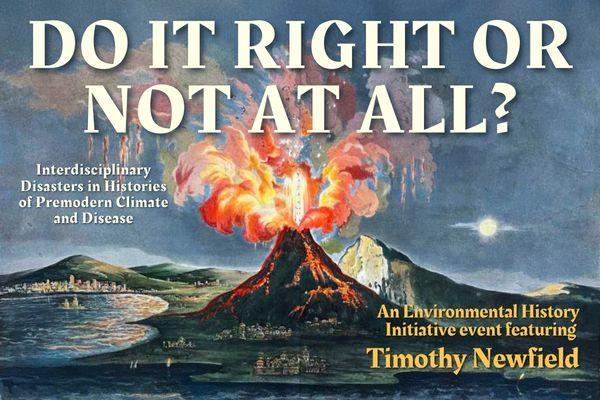
February 7, 2025
4:00 pm
-
5:30 pm
Dulles Hall, Room 168
Add to Calendar
2025-02-07 17:00:00
2025-02-07 18:30:00
"Do it right or not at all? Interdisciplinary Disasters in Histories of Premodern Climate and Disease," Tim Newfield, Georgetown University
Timothy Newfield is Associate Professor of History and Biology at Georgetown University. If a virus emerged 1,500 years ago and went extinct not long afterwards how would we know? If a massive volcanic eruption cooled the planet for 18 months in the tenth century what kind of history could we write about it today? This talk looks at how we write histories of premodern climate and disease. It speaks to the difficulties and advantages of working across very different fields of study to write interdisciplinary environmental histories. Via case studies of novel virus emergence in the sixth (or thereabouts) century and rapid climate change in the tenth century, the paper speaks to the need for sustained dialogue between fields, open minds, and humility. Histories infused with paleoscience can move rapidly. Yet, no matter how true the adage ‘publish or perish’ we must slow down and no matter the pressure we put on ourselves to ‘get it right’ we must be prepared to make mistakes and rewrite our histories as the science and the history advances. Tracing the recent history and future of a dead smallpox relative and of an impressive Icelandic volcanic eruption, demonstrates that no matter how right we try to be we will only be right for a period of time, but also that if we move too fast we are sure to blunder.
Dulles Hall, Room 168
OSU ASC Drupal 8
ascwebservices@osu.edu
America/New_York
public
Date Range
2025-02-07 16:00:00
2025-02-07 17:30:00
"Do it right or not at all? Interdisciplinary Disasters in Histories of Premodern Climate and Disease," Tim Newfield, Georgetown University
Timothy Newfield is Associate Professor of History and Biology at Georgetown University. If a virus emerged 1,500 years ago and went extinct not long afterwards how would we know? If a massive volcanic eruption cooled the planet for 18 months in the tenth century what kind of history could we write about it today? This talk looks at how we write histories of premodern climate and disease. It speaks to the difficulties and advantages of working across very different fields of study to write interdisciplinary environmental histories. Via case studies of novel virus emergence in the sixth (or thereabouts) century and rapid climate change in the tenth century, the paper speaks to the need for sustained dialogue between fields, open minds, and humility. Histories infused with paleoscience can move rapidly. Yet, no matter how true the adage ‘publish or perish’ we must slow down and no matter the pressure we put on ourselves to ‘get it right’ we must be prepared to make mistakes and rewrite our histories as the science and the history advances. Tracing the recent history and future of a dead smallpox relative and of an impressive Icelandic volcanic eruption, demonstrates that no matter how right we try to be we will only be right for a period of time, but also that if we move too fast we are sure to blunder.
Dulles Hall, Room 168
America/New_York
public
Timothy Newfield is Associate Professor of History and Biology at Georgetown University.
If a virus emerged 1,500 years ago and went extinct not long afterwards how would we know? If a massive volcanic eruption cooled the planet for 18 months in the tenth century what kind of history could we write about it today? This talk looks at how we write histories of premodern climate and disease. It speaks to the difficulties and advantages of working across very different fields of study to write interdisciplinary environmental histories. Via case studies of novel virus emergence in the sixth (or thereabouts) century and rapid climate change in the tenth century, the paper speaks to the need for sustained dialogue between fields, open minds, and humility. Histories infused with paleoscience can move rapidly. Yet, no matter how true the adage ‘publish or perish’ we must slow down and no matter the pressure we put on ourselves to ‘get it right’ we must be prepared to make mistakes and rewrite our histories as the science and the history advances. Tracing the recent history and future of a dead smallpox relative and of an impressive Icelandic volcanic eruption, demonstrates that no matter how right we try to be we will only be right for a period of time, but also that if we move too fast we are sure to blunder.
